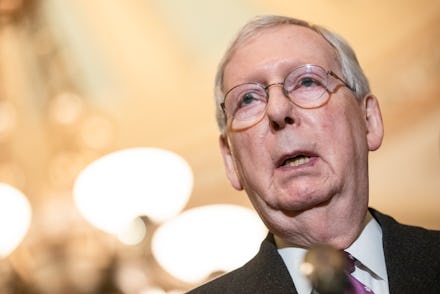Senate Republicans' $1 trillion relief plan gives the least money to the poorest families

In response to the millions of Americans who already suffer from low wages, being underinsured, or having debt, Democrats and Republicans have been working together on relief packages to mitigate the financial turmoil resulting from the coronavirus outbreak. The coronavirus bills have been introduced in waves, the first of which was signed into law two weeks ago and the second, the Families First Coronavirus Response Act, was signed into law by President Trump on Wednesday. On Thursday, Senate Majority Leader Mitch McConnell (R-Ky.) unveiled a new plan, intended to more directly juice the economy, but it is being criticized for its details.
The bill, which was drafted exclusively by the Republican majority in the Senate, calls for Americans to receive certain financial relief based on their income, with the poorest Americans receiving less money than others. Treasury Secretary Steven Mnuchin indicated that the Trump administration was considering sending checks directly to Americans earlier this week, but McConnell's bill takes that principle and twists it.
Under the Senate proposal, individuals who earned less than $75,000 in 2018 would receive adjusted payments between $600 and $1,200, while married taxpayers who in 2018 made less than $150,000 and filed their taxes jointly would receive a maximum payment of $2,400, with an additional $500 for each child. Those who didn't make enough in 2018 to pay income taxes will receive the lowest payment of $600.
As Jonathan Chait argues in New York, this system is likely to complicate and prolong the process of getting relief to Americans by tying disbursements to income rather than writing the same check to everyone. He also points out that because income is measured by 2018 tax returns, those who recently lost their job or had to close down a storefront might not qualify for full relief payments, despite needing the help given their current financial situation.
The plan won't send checks to wealthier families; individuals who earn more than $99,000 annually won't receive money. But in addition to the phase-out at the top, the plan also phases in at the bottom, which Chait notes means that poorer families will receive less than families who are better off.
The bill will likely cost the government upwards of $1 trillion. The idea behind direct payments, in addition to halting payroll taxes, is that families and individuals might be better able to afford expenses like rent, utilities, food, and other necessities during a time when many industries have slowed to a glacial pace. But the wonky formatting of the Republican bill has drawn bipartisan criticism, with The Washington Post writing Friday that "senators appeared all but certain to change it to ensure poorer Americans didn’t receive less money."
The plan also marked an odd misalignment between Senate Republicans and the White House. On Tuesday, Treasury Secretary Steven Mnuchin said that the administration wanted to send people checks for $1,000, if not more.
Americans will have to wait over the weekend to see what Congress and the White House eventually agree is an appropriate relief package. The Post said that Mnuchin and McConnell were hoping for a bill to pass the Senate by Monday.
Experts this week announced that the United States has already entered a recession — an economic downturn spurred by the steep drop in the stock market and reflected in the dramatic uptick in the unemployment claims filed in the past two weeks.